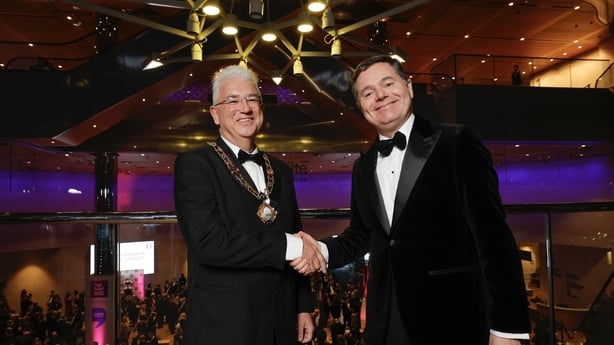It is very likely that the pandemic, war on European soil and the need to respond to climate change will be catalysts for major change in our economy and in our society, the Minister for Finance has said.
Addressing the Dublin Chamber annual dinner in Dublin's Convention Centre, Paschal Donohoe said he does not think globalisation will go into reverse.
However, he predicted that it is very likely that it will change, with "just-in-time" supply chains, perhaps being replaced by "just-in-case" supply chains, as firms place far greater emphasis on security rather than just efficiency.
"The change that we are seeing in energy prices and energy markets, not all that could be transitory," Mr Donohoe said.
"And digitalisation, which increased so rapidly during lockdown, is unlikely to be reversed in its entirety."
Mr Donohoe said this means that resilience is not a static concept, but a dynamic one and Ireland must remain flexible so we can deal with the changing future, which also includes opportunities.
He said three pillars of capital investment, certainty on corporate tax and competence would allow us to do this.
The minister also said we need politicians who can protect and preserve our economy.
"I believe that the political centre has served Ireland well over many decades, as we have seen our living standards change," he claimed.
"And I believe the centre has played a role in their resilience that makes a difference now."
He said that economic resilience had allowed the Government to respond back to two shocks, supporting households, businesses and the most vulnerable.
Calls for 20% Capital Gains Tax rate

The President of the Dublin Chamber has said the Government will have to do more to underpin the future prosperity of the city.
Vincent Harrison said better infrastructure and public services are needed to ensure the capital rises to meet the ambition of being a global city of renown, where people want to live, work and visit.
"The path may not always be easy, but we as Dublin business are here, Minister, to support Government in achieving growth and prosperity in the long run – and not just to seek compensation for the trials of the present," Mr Harrison said during his address to the chamber's annual dinner.
"Those taking a chance to set up their own business, and working hard to make it grow and scale, must be rewarded for the personal risk they are taking."
In this regard, Mr Harrison called on the Government to reduce the rate of Capital Gains Tax for indigenous firms to a simple 20%.
"We need to reward risk, encourage successful domestic businesses to double down and achieve global scale and to remove the attraction of relocating to other jurisdictions as they reach that scale," he told the 1,200 attendees.
In relation to delivery of infrastructure and transport projects, Mr Harrison said speed of planning and delivery will be key, along with the strong support of Government "in the face of what will be, difficult conversations around timelines and spending."
"Ambition is required here, so we call on Government to do everything in their power to get Metrolink up and running by 2030," he said.
The chamber leader also claimed that if a directly elected mayor for Dublin with robust powers is not going to happen, then there should be a cabinet-level minister with responsibility for the capital's development.
Mr Harrison said Dublin’s tight labour market is very much a symptom of the poor supply and high cost of accommodation in the region.
He said Government moves to incentivise those who already live in the city to return to work and also to increase female labour participation is a pragmatic and valuable initiative.
But he added that continued support for investment in housing and infrastructure is also paramount, as well as measures to ensure that vacant sites are put back into the market.
The managing director of Dublin Airport said that while Government supports aimed at offsetting some of the cost of businesses energy bills in the short run are helpful, the chamber strongly encourages Government to tackle the underlying problems.
This would involve helping businesses to transition to a lower carbon and energy efficient model so that energy costs remain manageable in the longer term, he claimed.







